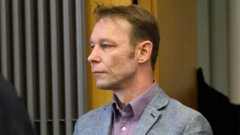Why Did Madeleine McCann's Suspect Refuse to Meet with Met Police?

Published: 2025-09-15 00:05:18 | Category: technology
The ongoing investigation into the disappearance of Madeleine McCann continues to capture public interest as new developments emerge. The prime suspect, Christian Brückner, has declined to cooperate with the Metropolitan Police, raising questions about the future of the case. Despite being a person of interest, Brückner has not been charged in relation to Madeleine's case, which remains one of the world's most high-profile unsolved missing persons investigations.
Last updated: 28 October 2023 (BST)
Key Takeaways
- Christian Brückner, the prime suspect, has refused to be interviewed by the Metropolitan Police.
- He is currently serving a seven-year sentence for a separate crime committed in Praia da Luz.
- Brückner has not been charged in connection with Madeleine McCann's disappearance.
- Investigations into the case have spanned nearly two decades and involved multiple countries.
- Funding for the investigation has exceeded £13.2 million since its inception in 2011.
The Disappearance of Madeleine McCann
Madeleine McCann's disappearance on 3 May 2007 in Praia da Luz, Portugal, has become a significant part of criminal history. She vanished shortly after her parents, Kate and Gerry McCann, left her and her younger siblings asleep in their holiday apartment while they dined at a nearby restaurant. The case quickly garnered international media attention, leading to various theories and extensive investigations.
Christian Brückner: The Prime Suspect
Christian Brückner, a German national, emerged as the prime suspect in the case in 2020, more than a decade after Madeleine's disappearance. Brückner has a criminal history that includes sexual offences, and he is currently serving a seven-year prison sentence for the rape of a 72-year-old woman in Praia da Luz in 2005. This conviction has further complicated the ongoing investigation into Madeleine's case.
Brückner's Refusal to Cooperate
Recently, the Metropolitan Police made an effort to interview Brückner in relation to Madeleine's case. An international letter of request was submitted, but he rejected the opportunity to speak with investigators. Detective Chief Inspector Mark Cranwell stated that “in the absence of an interview, we will nevertheless continue to pursue any viable lines of inquiry.” This refusal raises concerns about the potential for new evidence or leads in the investigation, as legal complexities may hinder the process.
Legal Implications and Investigation Challenges
The differences in legal systems between Germany and the UK have added layers of complexity to the investigation. German authorities suspect Brückner of murder regarding Madeleine's disappearance, while the British police continue to treat it as a missing persons case. This distinction affects how evidence is gathered and presented in both countries, complicating the prosecution process should any charges be brought in the future.
Recent Developments and Evidence
Earlier this year, German prosecutors indicated that evidence suggests Brückner was in the vicinity of Praia da Luz at the time of Madeleine's disappearance. This has led to renewed searches, including a joint operation by Portuguese and German police in June, aimed at locating further evidence. However, these searches yielded no significant breakthroughs.
Historical Context and Investigation Timeline
Since Madeleine's disappearance, the investigation has gone through various phases, marked by international cooperation and media scrutiny. Brückner was not identified as a suspect until 2020, despite having spent significant time in the area from 2000 to 2017. His connection to Praia da Luz, coupled with his previous criminal behaviour, drew renewed interest from investigators.
The Role of Operation Grange
The Metropolitan Police initiated Operation Grange in 2011 to review and investigate the case comprehensively. To date, the funding for this operation has surpassed £13.2 million, reflecting the ongoing commitment to resolving the case. In April 2023, an additional £108,000 was allocated to support continued investigative efforts.
What Happens Next?
The future of the investigation remains uncertain. With Brückner declining to cooperate, investigators must explore alternative avenues for gathering evidence. They continue to chase viable leads, but without Brückner's testimony, the direction of the inquiry may shift. The case's longevity and complexity suggest that public interest will remain high as new developments occur.
Public and Media Interest
The disappearance of Madeleine McCann has not only captivated the UK but has also become a global phenomenon. The case has spurred numerous documentaries, books, and media articles, all aiming to unravel the mystery surrounding her disappearance. The continuous coverage reflects society's deep-seated interest in missing persons cases and the pursuit of justice.
Conclusion
The investigation into Madeleine McCann's disappearance remains one of the most challenging and high-profile cases in modern history. As the Metropolitan Police continue to pursue leads, the refusal of prime suspect Christian Brückner to cooperate presents significant hurdles. The enduring mystery surrounding Madeleine’s fate continues to evoke a profound sense of empathy and concern, highlighting the importance of vigilant investigative work.
FAQs
Who is Christian Brückner?
Christian Brückner is a German national and the prime suspect in the disappearance of Madeleine McCann. He has a criminal history and is currently serving a prison sentence for a separate crime.
Why did Brückner refuse to be interviewed?
Brückner declined to be interviewed by the Metropolitan Police, citing legal reasons that remain unclear. His refusal complicates the ongoing investigation into Madeleine's case.
What is Operation Grange?
Operation Grange is the Metropolitan Police's ongoing investigation into the disappearance of Madeleine McCann, which was initiated in 2011 and has received substantial funding over the years.
What evidence is there against Brückner?
Evidence suggests that Brückner was in Praia da Luz during the time of Madeleine's disappearance. However, no formal charges have been brought against him concerning the case.
What are the next steps in the investigation?
Investigators will continue to explore alternative leads and gather evidence. The refusal of Brückner to cooperate may necessitate new strategies for uncovering information regarding Madeleine's disappearance.



:max_bytes(150000):strip_icc():focal(999x0:1001x2)/james-marsden-2025-emmys-091425-306c659cd67846098a673c2ac1c414ea.jpg)